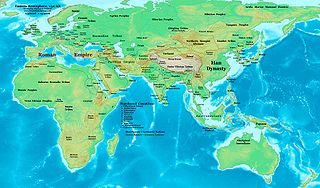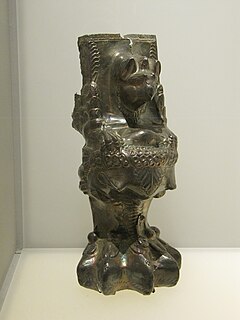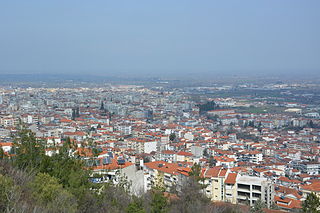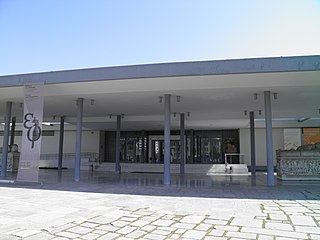
The 1st century was the century AD 1 to AD 100 according to the Julian calendar. It is often written as the 1st century AD or 1st century CE to distinguish it from the 1st century BC which preceded it. The 1st century is considered part of the Classical era, epoch, or historical period.

The first millennium was a period of time spanning the years AD 1 to AD 1000 . World population rose more slowly than during the preceding millennium, from about 200 million in AD 1 to about 300 million in AD 1000.

In Roman mythology, Evander was a culture hero from Arcadia, Greece, who brought the Greek pantheon, laws, and alphabet to Italy, where he founded the city of Pallantium on the future site of Rome, sixty years before the Trojan War. He instituted the festival of the Lupercalia. Evander was deified after his death and an altar was constructed to him on the Aventine Hill.

Classical Latin is the form of the Latin language recognized as standard by writers of the late Roman Republic and the Roman Empire. In some later periods, it was regarded as "good" Latin, with later versions being viewed as debased or corrupt. The word Latin is now taken by default as meaning "Classical Latin", so that, for example, modern Latin textbooks describe Classical Latin. Marcus Tullius Cicero and his contemporaries of the late republic, while using lingua latina and sermo latinus to mean the Latin language as opposed to Greek or other languages, and sermo vulgaris or sermo vulgi to refer to the vernacular, referred to the speech they valued most and in which they wrote as latinitas, "Latinity", with the implication of good. Sometimes it was called sermo familiaris, "speech of the good families", sermo urbanus, "speech of the city" or rarely sermo nobilis, "noble speech". But besides latinitas, it was mainly called latine (adverb), "in good Latin", or latinius, "in better Latin".

Evander Holyfield is an American former professional boxer who competed from 1984 to 2011. He reigned as the undisputed champion at cruiserweight in the late 1980s and at heavyweight in the early 1990s, and remains the only boxer in history to win the undisputed championship in two weight classes. Nicknamed "The Real Deal", Holyfield is the only four-time world heavyweight champion, having held the unified WBA, WBC, and IBF titles from 1990 to 1992; the WBA and IBF titles again from 1993 to 1994 and between 1996 and 1999; and the WBA title for a fourth time from 2000 to 2001.

Atropatene was an ancient kingdom established and ruled under local ethnic Iranian dynasties, first with Darius III of Persia and later Alexander the Great of Macedonia starting in the 4th century BC and includes the territory of modern-day northern Iran, and a small part of the contemporary Azerbaijan Republic. Its capital was Ganzak. Atropatene also was the nominal ancestor of the name of the historic Azerbaijan region in Iran.
Eochaid or Eochaidh is a popular medieval Irish and Scottish Gaelic name deriving from Old Irish ech, horse, borne by a variety of historical and legendary figures.

Indo-Scythians were a group of nomadic Iranian peoples of Saka and Scythian origin who migrated southward into western and northern South Asia from the middle of the 2nd century BC to the 4th century AD.

A galea was a Roman soldier's helmet. Some gladiators, specifically myrmillones, also wore bronze galeas with face masks and decorations, often a fish on its crest. The exact form or design of the helmet varied significantly over time, between differing unit types, and also between individual examples – pre-industrial production was by hand – so it is not certain to what degree there was any standardization even under the Roman Empire.

The Byzantine calendar, also called "Creation Era of Constantinople" or "Era of the World", was the calendar used by the Eastern Orthodox Church from c. 691 to 1728 in the Ecumenical Patriarchate. It was also the official calendar of the Byzantine Empire from 988 to 1453, and of Kievan Rus' and Russia from c. 988 to 1700. Since "Byzantine" is a historiographical term, the original name uses the noun "Roman" as it was how the Eastern Roman Empire continued calling itself.
Antiochus III Epiphanes was the ruler of the Kingdom of Commagene from 12 BC to 17 AD. He was the son and successor of King Mithridates III of Commagene and Iotapa, and of mixed Armenian, Greek and Median descent--the last through his mother. His parents were first cousins.

The Pharnavazid, Pharnabazid or Parnavazianni is the name of the first dynasty of Georgian kings of Kartli (Iberia) preserved by The Georgian Chronicles. Their rule lasted, with intermissions, from the 3rd century BC to the 2nd century AD. The main male line is reported to have become extinct early on and followed by houses related to it in the female line. By the close of the 2nd century AD, the Pharnavazid rule came to an end and the Arsacid Dynasty took over the crown of Iberia.
Evander, born in Phocis or Phocaea, was the pupil and successor of Lacydes, and was joint leader (scholarch) of the Academy at Athens together with Telecles.
Tiberius Julius Aspurgus Philoromaios was a Prince and Roman client king of the Bosporan Kingdom.
Adymus,Adymos or Hadymos,Hadymus son of Evander was a sculptor of the 1st century AD. His only preserved sculpture has been found in Idomene (Paeonia)
Evander is a masculine given name. It is anglicization of Greek Εὔανδρος. It has also been adopted as an anglicization of the Gaelic name Iomhar.













